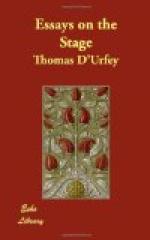And first, his Injustice appears by his ungentlemanlike exposing me and others by name, upon a scandalous occasion (as he endeavours to make it) without any Injury done by me to him, or ever giving him any provocation, or the Play’s any way deserving it. Oh, but he’ll say his Conscience urg’d him to do it—No—not a jot; ’twas dear darling Interest, in good faith, as shall hereafter appear; but in the mean time I am planted upon the shoulders of a Gyant, which is the Ingenious Author of the History of Don Quixote; and there indeed he guesses right, tho he knows nothing of him or of his History, as I will prove by and by, yet confidently, and Absolver-like, he ranges his objections under three heads, which are every one malicious and false, viz.
First, The Prophaneness, with respect to Religion and the Holy Scriptures.
Secondly, The Abuse of the Clergy.
Thirdly, The want of Modesty, and Regard to the Audience.
Well, to prove the Prophaneness, he first instances a bold Song of mine, as he calls it, against Providence; four of the last lines of which he is only pleas’d to shew ye.
But Providence, that form’d the
fair
In such a charming skin,
Their outside made its only care,
And never look’d within.
[Footnote: D. Quix. p. 1. p. 20.]
Here, says he, the Poet tells ye Providence makes Mankind by halves, huddles up the Soul, and takes the least care of the better Moyety; this is direct blaspheming the Creation, and a Satyr upon God Almighty. [Footnote: Collier p. 97.] Why, now this, I confess, is enough to provoke some heat in a fellow of my Constitution, to hear this Religious Raving; but yet it looks so like Oliver’s Porter’s in Bedlam, that I will be calm, and patiently holding up my hand, plead Not Guilty—to all of these objections. But first, pray why does he foyst in the word Mankind here to express the Female Sex, when t’other word is so much more proper. I did intend indeed a small Satyr upon Womankind, pursuant to Marcella’s Character, and he has vary’d from that word, I suppose, to amuse the Reader—I’ll give ye the whole Stanza.
Did coy Marcella own a Soul
As beauteous as her Eyes,
Her Judgment wou’d her Sence controul,
And teach her how to prize.
But Providence, that form’d the
fair
In such a charming Skin,
Their outside made its only care,
And never look’d within.
I only rally a pretty coy wench here for her sullen ill nature, without any Satyr on the Deity, or any thing like it; for as to the Blasphemy, as he calls it, by naming the word Providence, ’tis generally intended in Lyrical Poetry for Goddess Nature, or Fortune, as Mr Vanbrooke notes; but never apply’d seriously to the true Deity, but only by Dr Crambo. How often




